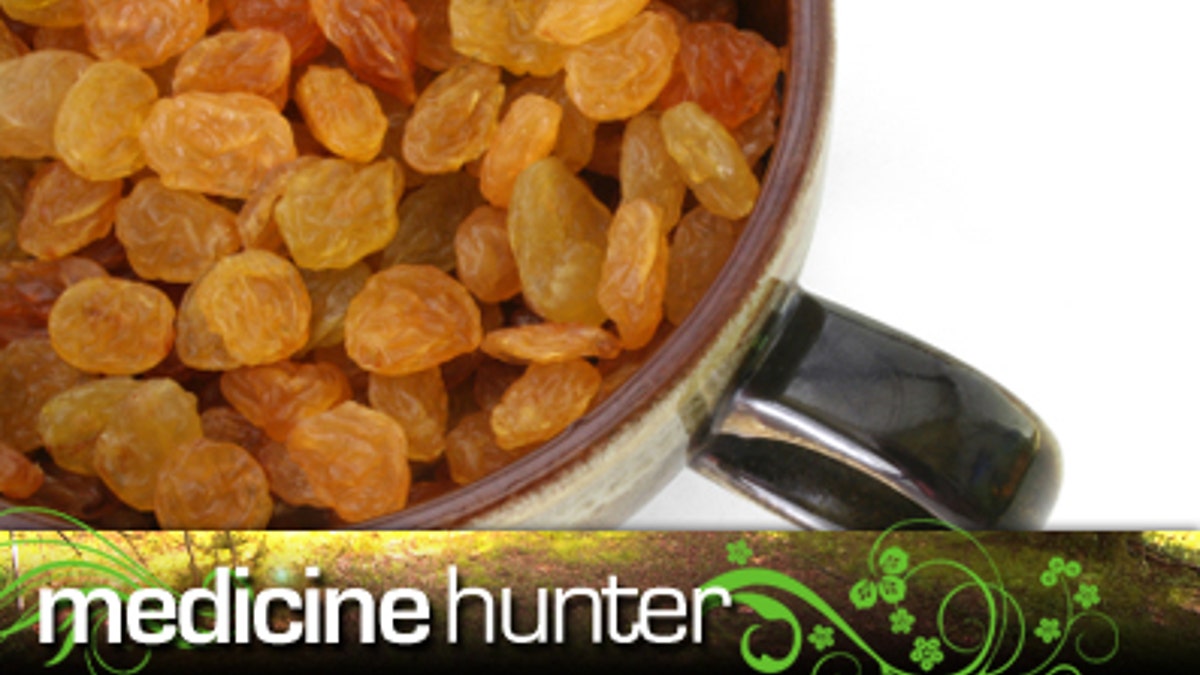
Periodically, certain folk remedies recirculate and garner fresh attention.
We have seen it happen with bee sting therapy for joint pain, lavender under a pillow for sleep and chicken soup for colds. Almost invariably, long-standing folk remedies appear to demonstrate real value when closely scrutinized, and scientists eventually figure out how they work.
Enter gin-soaked golden raisins, a folk remedy for relieving arthritis pain. Like stories of other remedies, this one won’t quit. We can thank the late inveterate radio celebrity Paul Harvey for helping to make this popular, at least over the past 20 years. And given the number of people who have tried this remedy and had relief, it’s fair to say that this one works. How? We’re not completely sure, but we have some very good ideas.
For starters, the remedy is as follows. Place a box full of golden raisins (must be golden) in a glass vessel, like a canning jar. Pour in gin specifically made with Juniper berries, until the raisins are completely covered. Let the raisins sit for a week at room temperature and soak up the gin. After that, eat 10 raisins per day. Theoretically, if you have arthritis pain, this will help.
OK, what a strange remedy. Let’s do a little digging, and see what we can figure. Golden raisins are sultana grapes, to which sulfur dioxide has been added to keep them golden. Sultana grapes are from Turkey, Greece, Iran or South Africa. In the U.S., they are cultivated under the name Thompson seedless grapes. These grapes are rich in the compounds resveratrol, catechins, potassium and vitamin C. Both resveratrol and catechins are antioxidant compounds, which also demonstrate anti-inflammatory activity. Arthritis pain involves inflammation of the joints. So possibly, these compounds are implicated in the efficacy of the gin-soaked raisin arthritis remedy.
Then there is the gin, made specifically from Juniper berries. As it turns out, juniper berries are laden with anti-inflammatory compounds, including catechin, alpha-pinene, alpha-terpineol, beta-pinene, betulin, caryophyllene, delta-3-carene, epicatechin, limonene, menthol and rutin. They are packed with anti-arthritic activity!
On top of that, the sulfur dioxide used to keep golden raisins golden also possesses anti-inflammatory properties.
When you soak the golden raisins in the juniper berry gin, the gin extracts many of the compounds in the raisins, making them more readily absorbed when you consume the raisins. As far as eating only 10 raisins per day? What would happen if you ate only nine? Or 11? It would still work.
The deductions here do not add up to an absolute guarantee that gin-soaked raisins will work to relieve your arthritis pain. But without question, there are enough anti-inflammatory, pain-relieving compounds in the golden raisins, the sulfur dioxide and the juniper gin to add up to a lot of very likely pain relief.
So here is a recommendation: Unless you are allergic to sulfites, go ahead and give the juniper gin-soaked golden raisin remedy a try. Remember, it’s always best to talk to your doctor first before trying something new. Raisins are basically good for you, and the tiny bit of gin that will plump up 10 raisins is not likely to get you loopy. You might even try getting some organic Thompson seedless raisins, which do not contain sulfur dioxide, and make the recipe. I am always for organic. But with all the powerful anti-inflammatory compounds in the mixture, you may in fact experience relief. For a fair trial, stick with the regimen for a couple of weeks. If it works, keep going.
Nature provides an abundance of remedies, and some of them may seem quite strange at first blush. But often a bit of scientific detective work reveals good reasons for their purported effectiveness. Gin-soaked raisins, advocated by Paul Harvey and a multitude of arthritis sufferers, appear to be a worthwhile remedy.
Chris Kilham is a medicine hunter who researches natural remedies all over the world, from the Amazon to Siberia. He teaches ethnobotany at the University of Massachusetts Amherst, where he is Explorer In Residence. Chris advises herbal, cosmetic and pharmaceutical companies and is a regular guest on radio and TV programs worldwide. His field research is largely sponsored by Naturex of Avignon, France. Read more at www.MedicineHunter.com







































